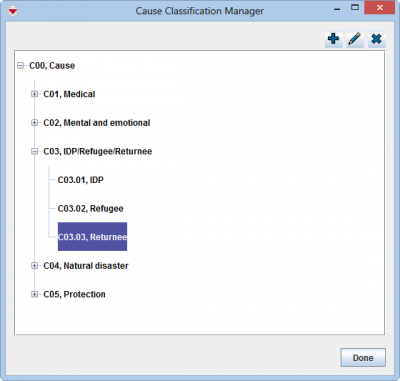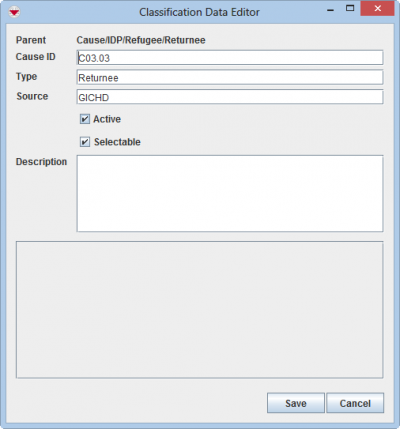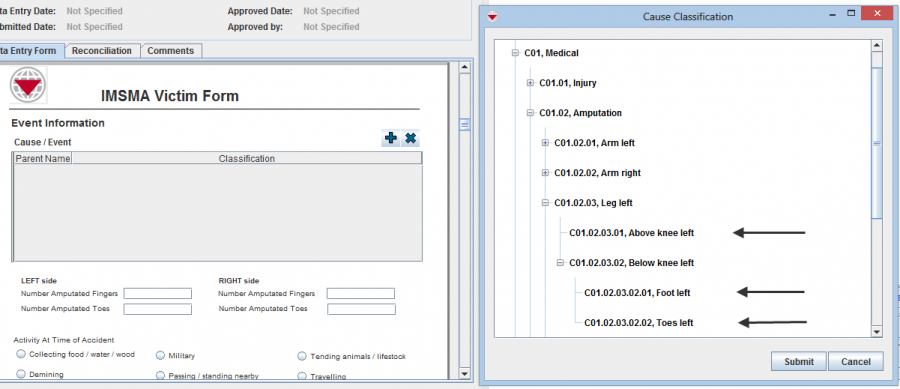Difference between revisions of "Add Cause Classification"
(Created page with "{{Note | To add an Cause classification, your {{IMSMANG}} user account must belong to a User Role that has permission ''Cause classification'' with ''Read and Write'' level. C...") |
|||
| (10 intermediate revisions by the same user not shown) | |||
| Line 1: | Line 1: | ||
| − | {{Note | To add | + | {{Note | To add a Cause classification, your {{IMSMANG}} user account must belong to a User Role that has permission ''Cause classification'' with ''Read and Write'' level. Contact your {{IMSMANG}} Administrator if you have questions on permissions. }} |
| + | |||
| + | With the Cause classification it is possible to widen the "traditional" victim definition. [[Correspondent Injury Cause |'''Here''']] you see how the 5.x Injuries correspond to the Cause classification provided as '''inspiration''' classification with the 6.0 installation and you will get an overview of the classification in this '''[[Media:Cause classification.xlsx|Excel file]]'''. | ||
To add Cause classification to {{IMSMANG}}: | To add Cause classification to {{IMSMANG}}: | ||
<ol> | <ol> | ||
| − | <li> | + | <li>In the '''Data Entry''' menu → '''Cause Classification'''.</li> |
| − | |||
[[Image:Cause_manager.png | 400px | center]] | [[Image:Cause_manager.png | 400px | center]] | ||
<br> | <br> | ||
<li>Select the node of the parent to the Cause classification that you would like to add.</li> | <li>Select the node of the parent to the Cause classification that you would like to add.</li> | ||
<li>Click the [[File:FieldTemplateIcon.png|20px]] button.</li> | <li>Click the [[File:FieldTemplateIcon.png|20px]] button.</li> | ||
| − | |||
[[Image:Cause_editor.png | 400px | center]] | [[Image:Cause_editor.png | 400px | center]] | ||
| Line 20: | Line 20: | ||
<li>If the classification is inactive, it is not possible do use for data entry but it is visible in Search etc.</li> | <li>If the classification is inactive, it is not possible do use for data entry but it is visible in Search etc.</li> | ||
<li>If the classification is selectable means that it is possible to choose it during Data Entry.</li> | <li>If the classification is selectable means that it is possible to choose it during Data Entry.</li> | ||
| − | By specifying if a node is selectable or not, each country set their own rules on how detailed data entry should be done. Each branch of the Cause classification tree structure may be different. | + | By specifying if a node is selectable or not, each country set their own rules on how detailed the data entry should be done. Each branch of the Cause classification tree structure may be different. |
| − | [[Image: | + | [[Image:Cause_selectable.png|900px|center]] |
<div align="center"> | <div align="center"> | ||
| − | ''In this example the user cannot be vague about which is the Cause that | + | ''In this example the user cannot be vague about which is the Cause that made a person become a victim. According to the selectable rule set here in Cause Classification, it is not possible to select Medical, Injury, Amputation, Left leg, the user must specify more exact the type of amputation.'' |
</div> | </div> | ||
<li>Enter a description of the classification.</li> | <li>Enter a description of the classification.</li> | ||
<li>If there are any fields in the Custom Defined Fields section, enter data in those fields. </li> | <li>If there are any fields in the Custom Defined Fields section, enter data in those fields. </li> | ||
| − | <li> | + | <li>Click the '''Save''' button. |
| − | + | </ol> | |
| − | |||
{{NavBox HowTo Standardizing Auxiliary Data}} | {{NavBox HowTo Standardizing Auxiliary Data}} | ||
| − | [[Category: | + | [[Category:NAA]] |
Latest revision as of 20:26, 17 June 2017
With the Cause classification it is possible to widen the "traditional" victim definition. Here you see how the 5.x Injuries correspond to the Cause classification provided as inspiration classification with the 6.0 installation and you will get an overview of the classification in this Excel file.
To add Cause classification to IMSMANG:
- In the Data Entry menu → Cause Classification.
- Select the node of the parent to the Cause classification that you would like to add.
- Click the
 button.
button. - Enter the Cause ID.
- Enter the name of the Cause classification.
- Enter the source of the Cause classification in the Source field e.g. WHO ICF.
- If the classification is inactive, it is not possible do use for data entry but it is visible in Search etc.
- If the classification is selectable means that it is possible to choose it during Data Entry.
- Enter a description of the classification.
- If there are any fields in the Custom Defined Fields section, enter data in those fields.
- Click the Save button.
If the classification is built up from an existing classification e.g. WHO’s ICF it is important to use the same ID as the external classification because when the external classification is updated it should be easy to update the classification list in IMSMANG.
By specifying if a node is selectable or not, each country set their own rules on how detailed the data entry should be done. Each branch of the Cause classification tree structure may be different.
In this example the user cannot be vague about which is the Cause that made a person become a victim. According to the selectable rule set here in Cause Classification, it is not possible to select Medical, Injury, Amputation, Left leg, the user must specify more exact the type of amputation.
| |||||||||||||||||||||||


